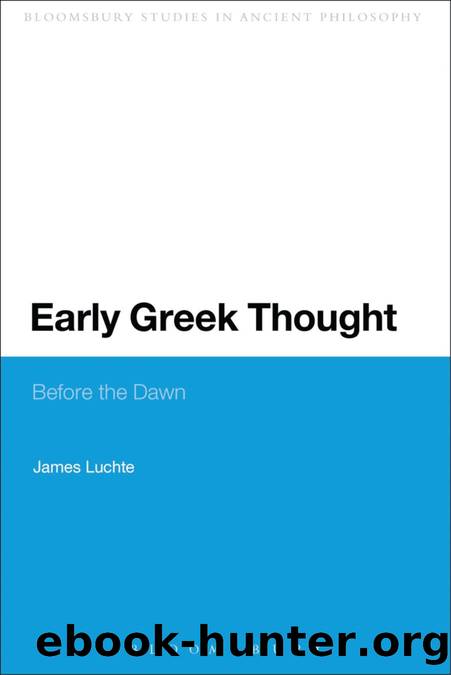Early Greek Thought by Luchte James.;

Author:Luchte, James.;
Language: eng
Format: epub
ISBN: 9781441156167
Publisher: Bloomsbury UK
Published: 2019-11-22T16:00:00+00:00
Part Two
Tragic Thought
Chapter 6
The Question of the First: Thales and Anaximander
Prelude: The Context of Emergence and the Ionian Movement
It is my wish – at this point in this study – that shadows of doubt have begun to creep into the ‘Western’ mythology, ‘ideology’, the habitual repetition of statements – that Thales is the first philosopher and with his fellow Ionians broke with all existing forms of knowledge, as is the perspective of most Analytic and Continental philosophers alike. Indeed, in our ‘account’, the ‘breach’ will take place much later with Plato and Christianity. As we have intimated, and as we will see in more detail in the following chapters, there is a radical continuity of Thales – and the ‘entirety’ of early Greek thought – with the context of emergence of the archaic lifeworld. Indeed, we could contend that no adequate understanding of early Greek thought would be possible ‘outside’ these methodological horizons. It is, in this light, our intention, in the following, to clear a ‘place’ for a portrayal of the indigenous ‘conversation’ of early Greek thought in a manner that is cognisant of the irreducible significance of the fragments of early Greek thought within the horizons of its context of emergence. The benefit of the approach is the conjuration of the philosophical lifeworld of the early Greeks in a manner which ‘disrupts’ the philological dispersion of these seminal thinkers into the suffocating idle chatter of source criticism and designations of doxographic authority. Besides Nietzsche’s incomplete attempt to conjure forth the personalities of the early Greek thinkers, there has been no work that lays out a coherent narrative of early Greek thought that would be sufficient, not only to allow us to comprehend this thought, but also, to recognize the sovereignty of this topos – irrespective of its tragic openness to uncertainty, ambiguity, and mortality.
The Ionians – Thales, Anaximander, Anaximenes, Xenophanes and Heraclitus – have been traditionally regarded as the first philosophers. The Ionians dwelled in an Athenian colony in Western Asia Minor, which is the west coast of Turkey. Ionia is famous, beyond its status as the ‘birthplace of philosophy’, for having been partially destroyed during the later wars with Persia, with Melitus, the city of philosophers, tragically annihilated, as were its philosophers. Thales received the honor of being not only the first philosopher, but also one of the ‘Seven Sages’, for his prediction of an eclipse in 585 BCE. It is certainly on the basis of such praise and accolades that Aristotle not only dubs Thales the first – yet, every gift has the taint of the poison of sacrifice – but also, confines him within the category of ‘natural philosopher’. We – and this includes everyone familiar with Aristotle – understand the latter’s ‘reasons’ for such a blatant ‘falsification’ – yet, such ‘traditions’ must be placed into radical question. For, clearly, it is not possible to understand early Greek thought is we allow our interpretation to succumb to the constellations of human, all too human, ‘authority’.
A
Download
This site does not store any files on its server. We only index and link to content provided by other sites. Please contact the content providers to delete copyright contents if any and email us, we'll remove relevant links or contents immediately.
| Africa | Americas |
| Arctic & Antarctica | Asia |
| Australia & Oceania | Europe |
| Middle East | Russia |
| United States | World |
| Ancient Civilizations | Military |
| Historical Study & Educational Resources |
The Daily Stoic by Holiday Ryan & Hanselman Stephen(2708)
The Fate of Rome: Climate, Disease, and the End of an Empire (The Princeton History of the Ancient World) by Kyle Harper(2436)
People of the Earth: An Introduction to World Prehistory by Dr. Brian Fagan & Nadia Durrani(2346)
Ancient Worlds by Michael Scott(2103)
Babylon's Ark by Lawrence Anthony(2070)
Foreign Devils on the Silk Road: The Search for the Lost Treasures of Central Asia by Peter Hopkirk(2056)
India's Ancient Past by R.S. Sharma(1987)
MOSES THE EGYPTIAN by Jan Assmann(1973)
The Complete Dead Sea Scrolls in English (7th Edition) (Penguin Classics) by Geza Vermes(1842)
Lost Technologies of Ancient Egypt by Christopher Dunn(1798)
The Daily Stoic by Ryan Holiday & Stephen Hanselman(1770)
The Earth Chronicles Handbook by Zecharia Sitchin(1744)
24 Hours in Ancient Rome by Philip Matyszak(1678)
Alexander the Great by Philip Freeman(1650)
Aztec by Gary Jennings(1545)
The Nine Waves of Creation by Carl Johan Calleman(1520)
Curse Tablets and Binding Spells from the Ancient World by Gager John G.;(1510)
Before Atlantis by Frank Joseph(1484)
Earthmare: The Lost Book of Wars by Cergat(1469)
